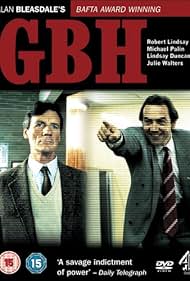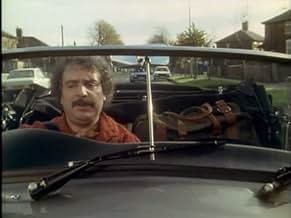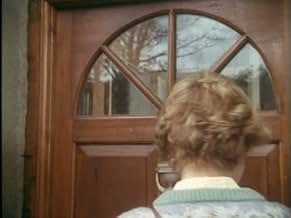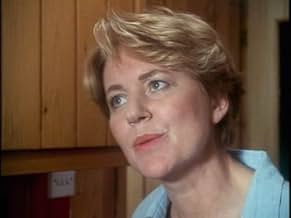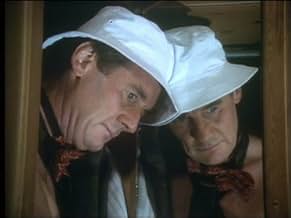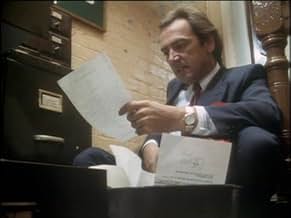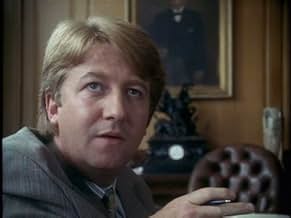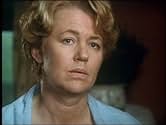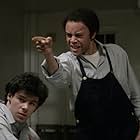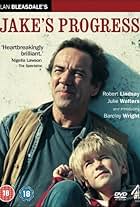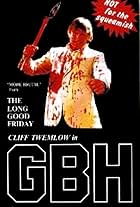Politician Michael Murray's life entwines with headmaster Jim Nelson's, changing their trajectories when their paths cross unexpectedly.Politician Michael Murray's life entwines with headmaster Jim Nelson's, changing their trajectories when their paths cross unexpectedly.Politician Michael Murray's life entwines with headmaster Jim Nelson's, changing their trajectories when their paths cross unexpectedly.
- Won 2 BAFTA Awards
- 5 wins & 7 nominations total
Browse episodes
Featured reviews
Putting aside Robert Lindsay's much deserved BAFTA for his portrayal of sleazy politician Michael Murray, this show is worth watching because Alan Bleasdale's script is simply phenomenal. Even when the plot actually on occasion does move where you think it will -- you'll still be surprised, amazed, amused, angered. In short, this must be something like the Elizabethan audiences felt when they first watched Hamlet. The script is densely layered, mounting complexities upon issues upon personalities. And for all that, one doesn't have to be a genius to understand it and be moved through a number of emotions and reactions before finally being hung out to dry. It's brilliant.
Just an addendum to my review: someone commented on the important scene which takes place during a Dr Who convention. 28 years previously, G.B.H. executive producer Verity Lambert had been the legendary original producer of Dr Who, who recruited William Hartnell as the first Doctor. There's no way that scene was a coincidence :)
GBH is an excellent view of the would-be overlords of local government in the UK, using everybody (whether within or without the overlord's grand plan) to achieve the goal of power.
The situation is viewed through the eyes of the elected local government official who is played like a puppet by the would-be power-mongers of the day (pseudo-socialists trying to hijack every situation to make the tory government of the day look ridiculous) regardless of the casualties caused by their actions.
The elected official starts out as a hard character, whose weak spots are exposed by the puppeteers through a relentless barrage of political and psychological attacks, gradually exposing the child within the hard exterior - and ultimately concluding with the deposition of said character - who departs with most of (if not all) of the audience's sympathy.
This is a riot of a screenplay, placing first our hatred, and then our sympathy with main character - often with bizarre & humorous consequences.
The situation is viewed through the eyes of the elected local government official who is played like a puppet by the would-be power-mongers of the day (pseudo-socialists trying to hijack every situation to make the tory government of the day look ridiculous) regardless of the casualties caused by their actions.
The elected official starts out as a hard character, whose weak spots are exposed by the puppeteers through a relentless barrage of political and psychological attacks, gradually exposing the child within the hard exterior - and ultimately concluding with the deposition of said character - who departs with most of (if not all) of the audience's sympathy.
This is a riot of a screenplay, placing first our hatred, and then our sympathy with main character - often with bizarre & humorous consequences.
'GBH' set a formidable standard for TV drama to follow when it was first shown on Channel 4 in 1991, and nothing managed to better it. It is, superficially, the story of two men. The first is Michael Murray (Robert Lindsay), the brash leader of the council of an unnamed Northern city (but blatantly inspired by the Derek Hatton regime in 1980s Liverpool- only Hatton was never this fascinating!). Murray is, it seems a man who runs the town like a gangster and a 'baddie'. The other is Jim Nelson (Michael Palin in his best ever dramatic performance) the idealistic headmaster of a school for special needs children). The arena is set for a funny two-hour film about politicians and the common man. But 'GBH' is 11 hours long; we are taken into the deepest recesses of the two protagonists' minds- Murray is hounded by a memory from his schooldays and even in his brief moment of triumph suddenly shouts 'I wish I was a good man!' Nelson, although standing up to Murray, becomes shocked at his own courage, which leads to him seeking psychiatric help. Meanwhile, the scope of the series widens from local to national, with both men caught in a plot of ever-increasing complexity where our feelings for characters deepen with the revelations about them onscreen. Robert Young directs the series with astonishing cinematic flair and Alan Bleasdale shows again why he is as good a television writer as Dennis Potter, if not better. The incredible scope of the series puts it in the same league as the greatest mini-series of all, 'Edge of Darkness'. It encompasses heartbreaking tragedy (the electrocution scene) with hilarious comedy (Murray, stricken with a twitch and a 'Strangelove' arm, trying to find condoms in a hotel full of 'Doctor Who' fans) with consummate ease. It remains hard to find nowadays- the discontinued VHS release has been sold for exorbitant amounts - but it remains the jewel of 90s television and is not to be missed if you get the chance to see it.
This is British drama at it's ultimate. There has been little to touch it since it's release. Bleasedale's script is full of twists and turns taking you from outright hatred and revulsion of the main characters through pity, sympathy and finally on to adoration.
The story is truly mesmerising, on the face of it a plain story of extreme left-wing politics in local government. So very typical of the late 70's and early 80's Britain and led to the phrase "Loony Left".
As the story progresses we learn that not all is quite what it seems. Michael Murray (Robert Linsay) is shown to be just as much of a pawn of the system, as the wretched Jim Nelson (Michael Palin) who he tries to take down in the first few episodes.
The acting is powerful, and way beyond what is expected of a TV drama. Look out for many of Bleasedale's favourite actors throughout the story.
Sadly this was one of the last real dramas produced and funded by UK Channel 4 before they were forced by the UK government to produce more 'popular' programming. A move that eventually forced C4 from becoming the major source of funding for British film, into nothing more than a proud sponsor.
The story is truly mesmerising, on the face of it a plain story of extreme left-wing politics in local government. So very typical of the late 70's and early 80's Britain and led to the phrase "Loony Left".
As the story progresses we learn that not all is quite what it seems. Michael Murray (Robert Linsay) is shown to be just as much of a pawn of the system, as the wretched Jim Nelson (Michael Palin) who he tries to take down in the first few episodes.
The acting is powerful, and way beyond what is expected of a TV drama. Look out for many of Bleasedale's favourite actors throughout the story.
Sadly this was one of the last real dramas produced and funded by UK Channel 4 before they were forced by the UK government to produce more 'popular' programming. A move that eventually forced C4 from becoming the major source of funding for British film, into nothing more than a proud sponsor.
Storyline
Did you know
- TriviaAlthough no name is given to the fictional city in which this show was set, it was filmed largely in and around Greater Manchester. However, speculation that the city is intended to be Liverpool stems from the fact that the character of Michael Murray is a thinly veiled characterization of Derek Hatton, the former Labour deputy leader of Liverpool City Council. Hatton achieved notoriety in the 1980s when he refused to co-operate with the rate-capping policy of the Conservative government and was a strong follower of Trotskyist Militant Tendencies. Hatton was expelled from the Labour Party in 1986, and in 1993 he was accused of corruption during his time as Deputy Leader of the Council. He was brought to trial, but was exonerated. After the first episode was aired, Channel 4 declined to provide preview tapes of the remaining instalments to Merseyside Police, who were concerned the programme could affect Hatton's court case regarding corruption. Alan Bleasdale downplayed the connection, leading Hatton to comment, "the only person in the world who does not seem to think that Michael Murray is me, is Alan Bleasdale".
- Quotes
[a Doctor Who convention is taking place in the hotel. A man dressed as a Dalek is following a woman dressed as Doctor Who's assistant Jo Grant towards her bedroom]
Dalek: [Dalek voice] Foooooooooornicate! Foooooooooornicate!
- Alternate versionsThe series was originally broadcast in seven episodes of approximately 90 minutes each; however, for some repeat screenings, the series has been recut into 10 hour-long episodes.
- ConnectionsFeatured in Right to Reply: Episode dated 20 April 1991 (1991)
- How many seasons does G.B.H. have?Powered by Alexa
Details
Contribute to this page
Suggest an edit or add missing content

